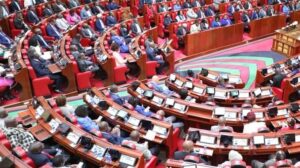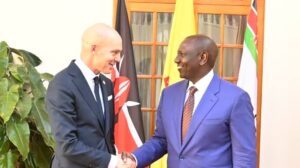Permanent Representative to the UN Habitat, Nairobi, and former Health Cabinet Secretary Susan Nakhumicha has come under heavy criticism for remarks that seem to openly encourage the Luyha community to exploit government resources for personal gain.
Speaking at the burial of Mama Agatha, mother of former Sports CS Ababu Namwamba, Nakhumicha told the Luyha people that it was time for them to “eat everything in the government” while in power, framing government positions as an entitlement rather than a responsibility.
Her statements appear to condone looting and disregard the principles of ethical leadership.
Nakhumicha’s words went further, urging the community not to beg but to demand what she claims is theirs by right.
She used a Bukusu saying to justify her stance: “when you want to eat good things that the mother has prepared, you have to eat when you are still inside the house before she goes out.”
She suggests that being in government grants unrestricted access to resources, turning public service into a tool for personal or ethnic enrichment rather than national duty.
She also dismissed the idea of restraint or accountability, warning against leaders who might try to divide the community and asserting that intelligence and delivery justify entitlement.
Her example, citing even Ambassador Ababu Namwamba as a potential leader, reinforces a dangerous narrative: that positions in government exist to benefit select communities and individuals rather than serve the public.

Nakhumicha’s return to government less than a year after her July 2024 dismissal as Health CS adds to the controversy.
In March 2025, President William Ruto appointed her Permanent Representative to the UN Habitat, Nairobi, under Executive Order No. 1 of 2025, a move intended to strengthen government operations and advance the Bottom-Up Economic Transformation Agenda.
Critics argue that her statements undermine these very objectives, turning a role meant to serve public and international interests into a platform for personal and ethnic gain.
Before her return to government, Nakhumicha admitted to financial struggles, farming and selling cabbages in Cherangany, and received support from Western Kenya leaders urging her reappointment.
Yet, her recent remarks suggest that her focus is not on service or reform but on exploiting her position and encouraging others to do the same.
Public outrage is growing, with many pointing out that Nakhumicha’s comments normalize corruption and entitlement. By urging the Luyha community to take everything “while we are still inside the house,” she risks sending a message that ethical governance is optional and that looting under the guise of community rights is acceptable.
Such rhetoric from a high-profile government official not only damages trust but also sets a worrying precedent for future leaders.
Nakhumicha’s statements highlight a severe failure in leadership ethics, promoting self-interest over national duty. Citizens and observers are left questioning whether she is committed to public service or merely using her positions to enrich herself and her community, showing utter disregard for the principles of accountability and fairness.





















Add Comment